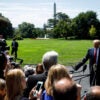At a time when Washington has almost nothing to say about national defense, Senator Kelly Ayotte (R–NH) recently delivered a major address on America’s state in the world.
Speaking before an audience at The Heritage Foundation, Ayotte highlighted the importance of promoting a 21st-century agenda of peace through strength. Americans may not be paying attention to America’s place in the world, Ayotte pointed out, but the rest of the world is.
In large part, she argued the White House has been overwhelmed because it lacks a serious game plan for playing the great game. The Administration’s approach to strategy, she argued, is producing “naïve wish lists.”
Today America faces a number of threats to its vital national interests: the return of great-power competition, the proliferation of weapons of mass destruction and weapons of lethal precision, the spread of violent extremism, and the dangers presented by failed or failing states.
Nevertheless, Congress and the President have reduced defense budgets by almost $500 billion over the next 10 years and have enacted a sequestration that, unless reversed, will require another $500 billion in reductions. These decisions were made with no analysis of their impact on the military or the national security strategy.
The failure of the United States to sustain its defensive capabilities will lead to increasing levels of global risk and conflict, greater danger to the American homeland and America’s vital national interests, reduced economic growth, and a worsening of America’s fiscal crisis.
“It’s both tragic and telling that by 2019 the United States will be spending more on interest on the debt than we will on defending this nation,” Ayotte said.
She also lauded efforts by Heritage and the American Enterprise Institute to support the Project for the Common Defense, an independent, non-partisan coalition of volunteers committed to national defense policies defined by strategic clarity and robust capabilities.
While tactical questions relating to the use of military force often divide Americans, a bipartisan consensus regarding America’s enduring strategic interests—such as the one that emerged in the aftermath of World War II—is not only possible but essential.
This is the wrong time for America to lack a clear and determined purpose in the world.





























